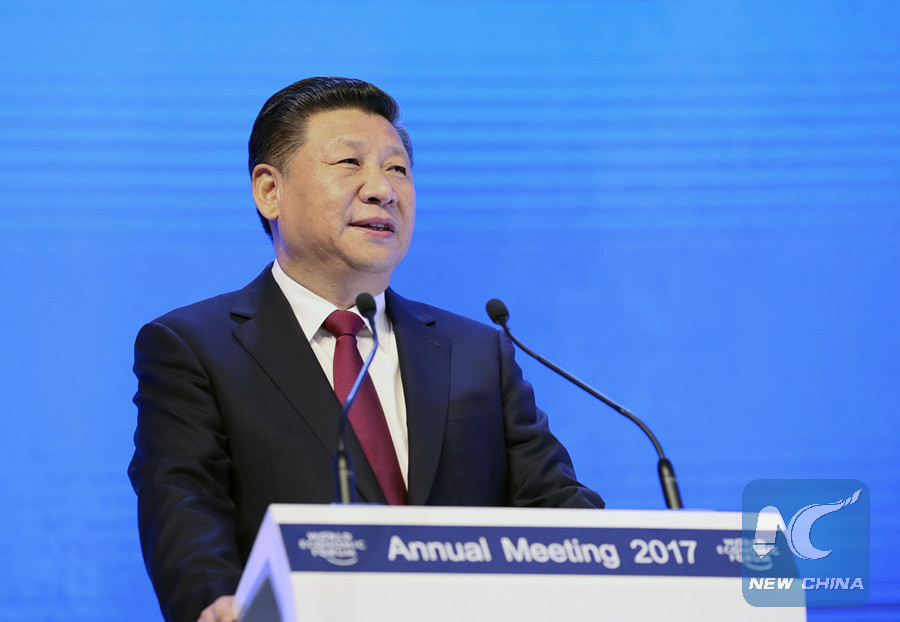
Chinese President Xi Jinping delivers a keynote speech at the opening plenary of the 2017 annual meeting of the World Economic Forum in Davos, Switzerland, Jan. 17, 2017. (Xinhua/Lan Hongguang)
BEIJING, Jan. 19, 2017 (Xinhua) -- Chinese President Xi Jinping wrapped up his four-day visit to Switzerland on Jan. 18. Here are the highlights of Xi's keynote speech at the opening ceremony of the 2017 annual meeting of the World Economic Forum (WEF) in Davos, and the Chinese president's meetings with leaders of the Alpine country and several major international organizations.
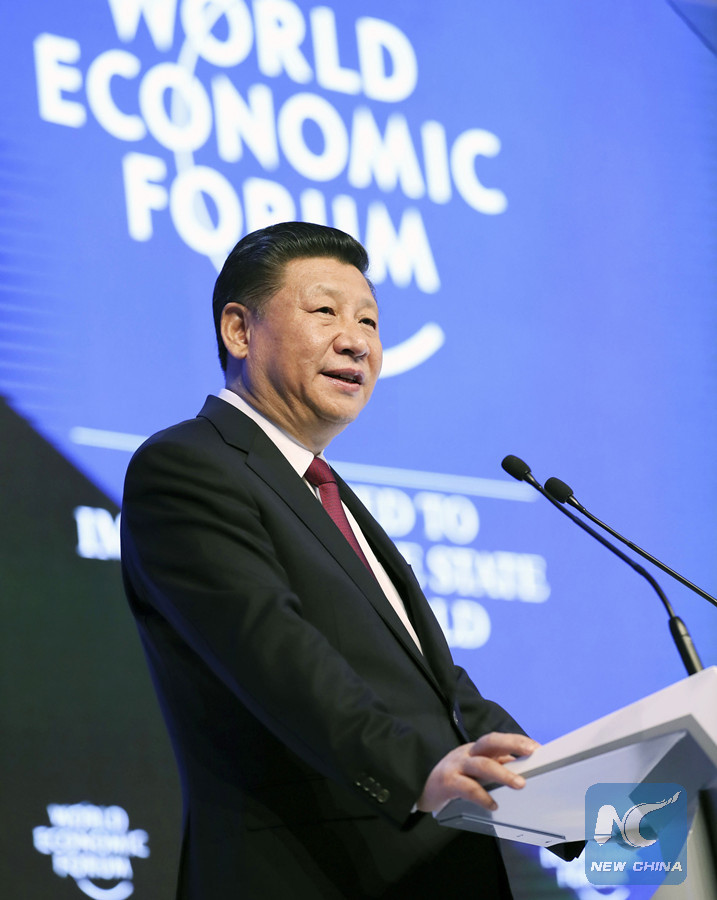
Chinese President Xi Jinping delivers a keynote speech at the opening plenary of the 2017 annual meeting of the World Economic Forum in Davos, Switzerland, Jan. 17, 2017. (Xinhua/Lan Hongguang)
It is the first state visit to the European country by a Chinese president in the 21st century. And meanwhile, Xi is the first Chinese head of state who has attended the Davos meeting.
Xi's address at the 2017 WEF in Davos beamed the much-needed confidence into the global economy amid grave concerns over rising protectionism and uncertainties in the wake of Brexit and the election of next U.S. President Donald Trump.
The president called on the international community to face up to the problems caused by the globalization instead of dodging them.
Xi stressed the importance of developing a dynamic innovation-driven growth model, a model of open and win-win cooperation featuring a well-coordinated and inter-connected approach, and a model of fair and equitable governance in keeping with the trend of the times, and a balanced, equitable and inclusive development model.
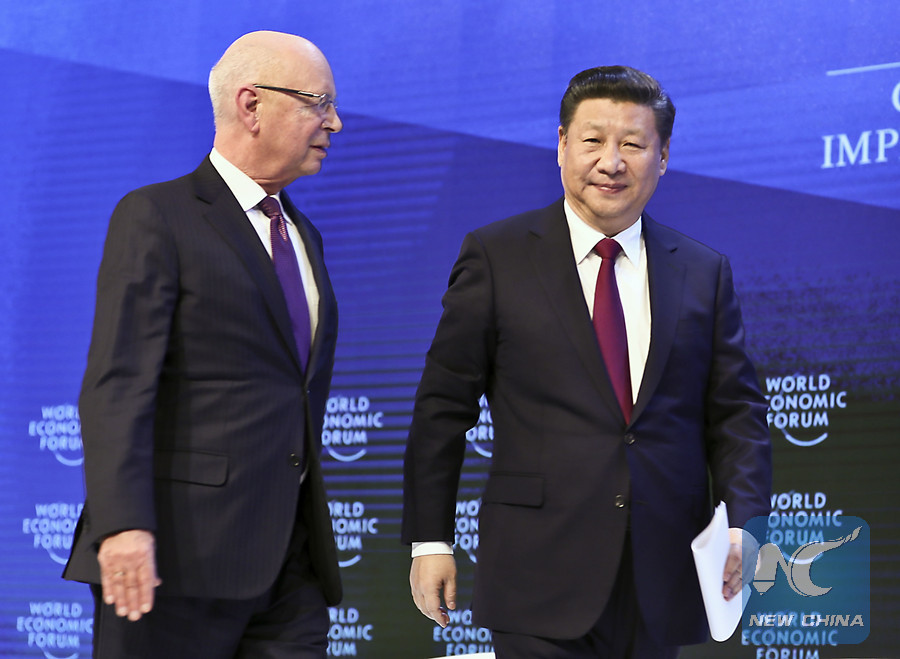
Chinese President Xi Jinping (R) walks with Klaus Schwab, founder and executive chairman of the World Economic Forum, in Davos, Switzerland, Jan. 17, 2017. (Xinhua/Lan Hongguang)
Xi pledged that China's development will continue to offer opportunities to business communities in other countries, and that China will advance the building of the Free Trade Area of the Asia-Pacific and negotiations of the Regional Comprehensive Economic Partnership to form a global network of free trade arrangements.
He also announced China's plans to host a Belt and Road forum for international cooperation in Beijing this May to brainstorm on interconnected development as part of China's efforts to make globalization more inclusive and beneficial to all.
In a meeting with WEF founder and Executive Chairman Klaus Schwab after the speech, Xi noted that cooperation between China and the WEF has become increasingly substantial and fruitful and stressed that "we must send positive signals together and boost confidence in the process of economic globalization."
Hailing Xi's keynote speech as a highlight in the WEF history, Schwab said that Xi's "thought-provoking" speech will chart the course of global economy and that the WEF is willing to further strengthen its partnership with China.
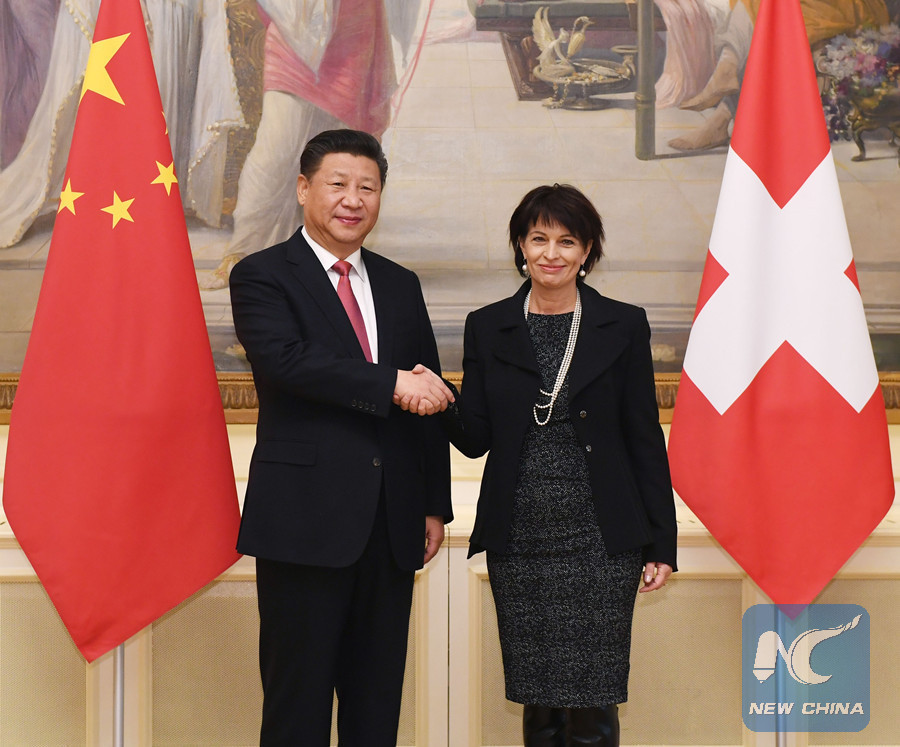
Chinese President Xi Jinping (L) shakes hands with his Swiss counterpart Doris Leuthard in Bern, Switzerland, Jan. 16, 2017. (Xinhua/Rao Aimin)
Xi's visit also witnessed the signing of a series of cooperation agreements between China and Switzerland, covering diplomacy, free trade, energy, customs, intellectual property rights, culture, education, sports and others.
During talks between Xi and his Swiss counterpart Doris Leuthard in the Swiss capital city of Bern on Monday, the two countries pledged to better develop their innovative strategic partnership and jointly oppose trade protectionism.
"The China-Switzerland relations have become a model of friendship and cooperation between countries that are different in social system, development stage and size," Xi said. "We are willing to work with the Swiss side for an even better development of our ties," he said.
For her part, Leuthard said the two countries have maintained sound relations since they forged diplomatic ties and have similar views on many issues concerning international peace and development.
The two countries agreed to align their respective development strategies and strengthen cooperation in promoting the Belt and Road Initiative proposed by China.
They also agreed to strengthen the alignment of "Made in China 2025" and Switzerland's Industry 4.0 strategies, and push for the upgrading of their bilateral free trade agreement that entered into force on July 1, 2014.
The two sides agreed to work together to protect the open and inclusive global trade regime, and push for a more just and equitable global governance system.
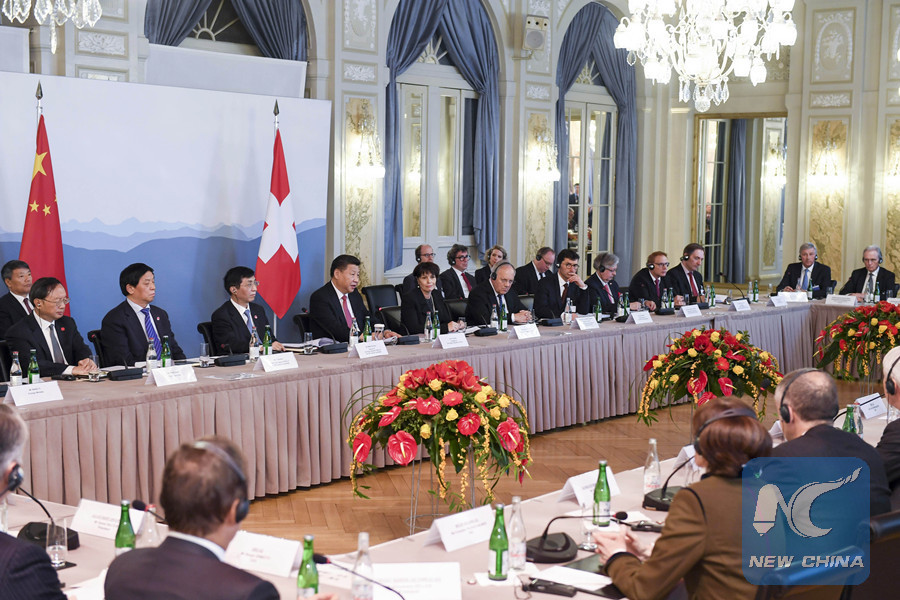
Chinese President Xi Jinping and his Swiss counterpart Doris Leuthard meet with Swiss business leaders in Bern, Switzerland, Jan. 16, 2017. (Xinhua/Li Xueren)
In Bern, Xi also met with Jurg Stahl, president of the National Council, and President of the Council of States Ivo Bischofberger, who are heads of the two chambers of the Swiss parliament.
Xi hailed the close inter-parliamentary exchanges between China and Switzerland. The legislatures of the two countries can strengthen their exchanges at various levels, and boost cooperation in the building of the legal system and in the fight against corruption, said Xi.
For their part, Stahl and Bischofberger said the Swiss side is ready to join China in promoting legislative exchanges, as well as cooperation in trade, education, energy efficiency and the Belt and Road Initiative.
Accompanied by Leuthard, the Chinese president also shared views with Swiss business leaders and called for the Chinese and Swiss business circles to work together for mutual benefits and against all kinds of trade protectionism.
The Swiss business leaders said they stand ready to increase their investments in China to expand high-tech cooperation with the Asian country.
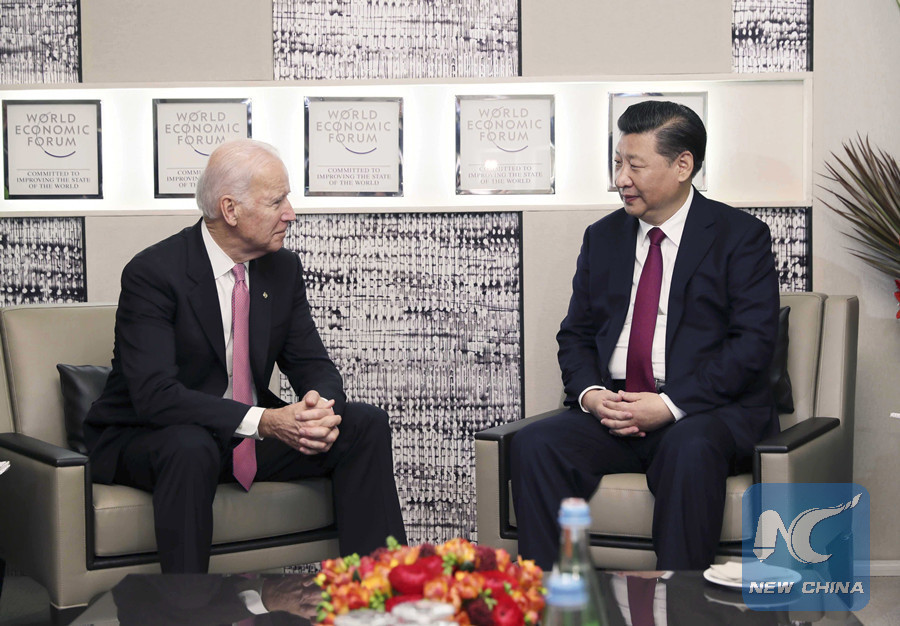
Chinese President Xi Jinping (R) meets with U.S. Vice President Joe Biden in Davos, Switzerland, Jan. 17, 2017. (Xinhua/Lan Hongguang)
On the sidelines of the WEF annual meeting in Davos, President Xi also met with U.S. Vice President Joe Biden, Belgian King Philippe and Ukrainian President Petro Poroshenko on Tuesday.
In talks with Biden, Xi called for joint efforts by China and the United States in building a long-term, stable and cooperative relationship to meet the interests of both countries and the world, while the U.S. vice president expressed hopes that the two nations could continue to deepen mutual trust and expand cooperation.
When meeting with King Philippe, Xi expressed support to the European integration process and opposition to trade protectionism, while King Philippe said Belgium will work together with China to further advance the European integration process and safeguard world peace and development.
At the meeting with Poroshenko, the Chinese president said China is willing to play a constructive role in the political settlement of the Ukraine crisis, while Poroshenko said Ukraine is willing to increase communication and coordination with China in the UN Security Council as Ukraine will assume the rotating presidency of the UN Security Council for February.
Xi then traveled to Lausanne and Geneva on Wednesday to visit the International Olympic Committee (IOC), the World Health Organization (WHO) and the United Nations Office at Geneva.
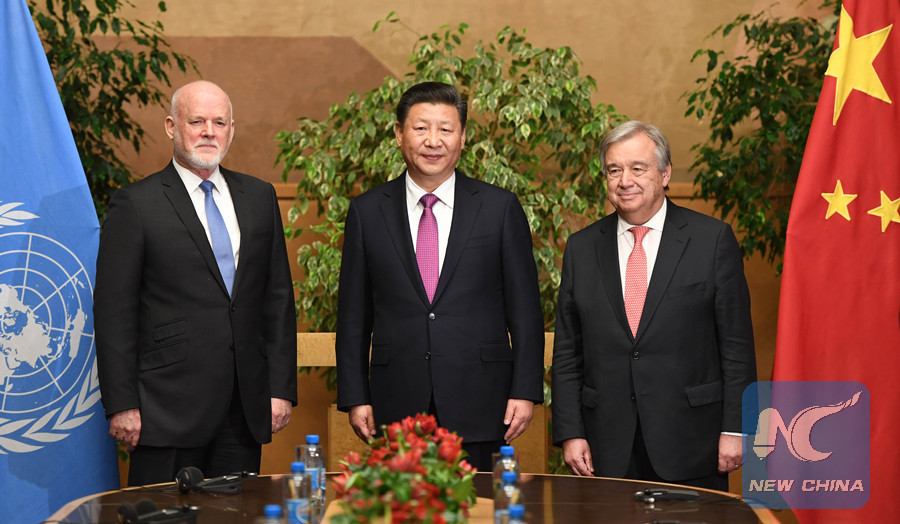
Chinese President Xi Jinping (C) meets with Peter Thomson (L), president of the 71st session of United Nations General Assembly, and UN Secretary-General Antonio Guterres in Geneva, Switzerland, Jan. 18, 2017. (Xinhua/Zhang Duo)
Xi said the United Nations, the most universal, representative and authoritative inter-governmental organization, should play a central role in global governance. He made the remarks while meeting with Peter Thomson, president of the 71st UN General Assembly, and UN Secretary-General Antonio Guterres at the United Nations Office at Geneva.
China will stick to the path of multilateralism, safeguard UN charters and related principles, and support the world body's bigger role in maintaining world peace and promoting common development, he said.
For their part, the two senior UN officials said the UN is willing to join China in promoting world peace and development, and in realizing the goal of building a community of shared future for mankind.
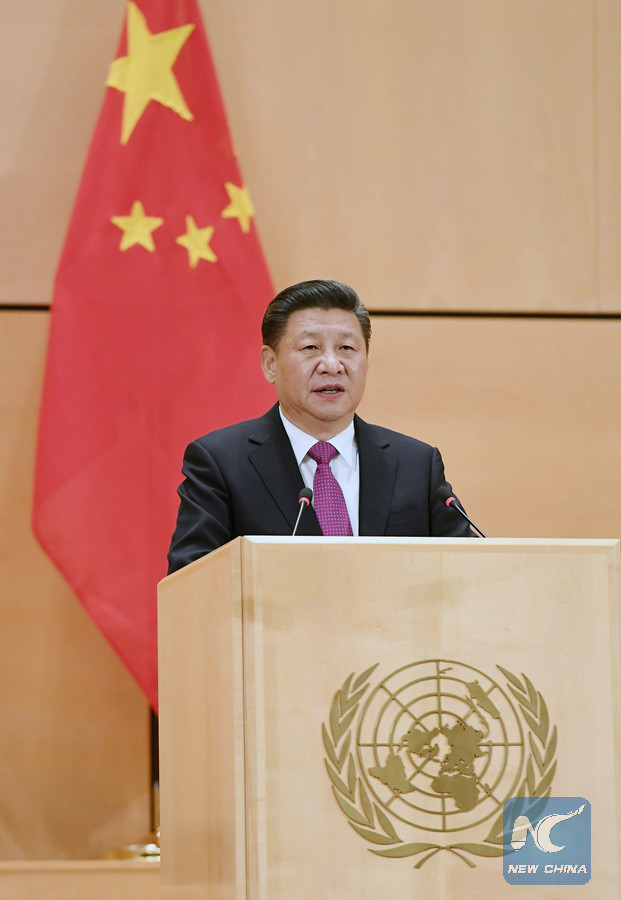
Chinese President Xi Jinping delivers a keynote speech at the United Nations Office in Geneva, Switzerland, Jan. 18, 2017. (Xinhua/Rao Aimin)
Xi also delivered a keynote speech at the United Nations Office at Geneva and called for building a community of shared future for mankind and achieving shared and win-win development amid growing challenges and risks.
While expounding his vision of mankind's future in the speech, the leader of the world's second largest economy championed a world of lasting peace, common security for all and common prosperity, as well as an open, inclusive world, and a clean, beautiful world.
"We should advance democracy in international relations and reject dominance by just one or several countries. All countries should jointly shape the future of the world, write international rules, manage global affairs and ensure that development outcomes are shared by all," he said.
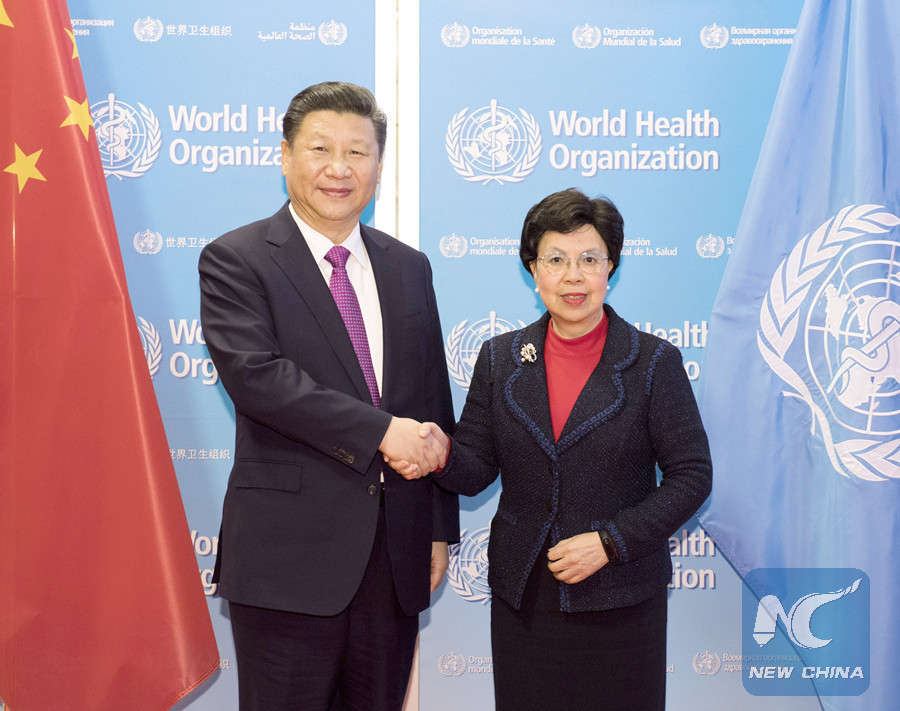
Chinese President Xi Jinping (L) meets with World Health Organization (WHO) Director-General Margaret Chan in Geneva, Switzerland, Jan. 18, 2017. (Xinhua/Li Xueren)
Xi also met with WHO Director-General Margaret Chan at the WHO headquarters in Geneva.
China and the WHO pledged to step up health cooperation under the framework of the China-proposed Belt and Road Initiative. A memorandum of understanding in this regard was signed between the two sides, witnessed by Xi and Chan.
"China welcomes the WHO's active participation in the construction of the Belt and Road, and of a 'healthy' Silk Road," Xi said.
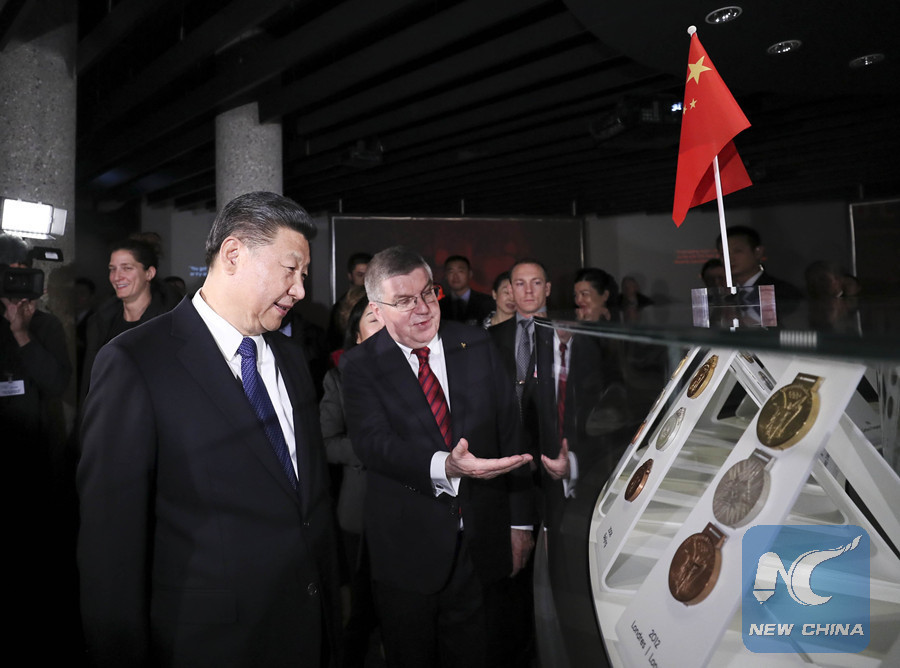
Chinese President Xi Jinping, accompanied by International Olympic Committee (IOC) President Thomas Bach, views a medals exhibition in Lausanne, Switzerland, Jan. 18, 2017. Xi met with Bach at the International Olympic Museum on Wednesday. (Xinhua/Lan Hongguang)
During the meeting with IOC President Thomas Bach in Lausanne, Xi pledged to make Beijing 2022 Winter Olympic Games a "remarkable, extraordinary and excellent event."
China will prepare and host the 2022 Games in a green, sharing, open and clean-fingered manner, and will take the 2022 Olympics as an opportunity to facilitate the nation's competitive sports and mass sports, Xi said.
For his part, Bach said the IOC stands ready to work with China in the preparations to make it a fascinating event, and help the Chinese people realize their dreams.
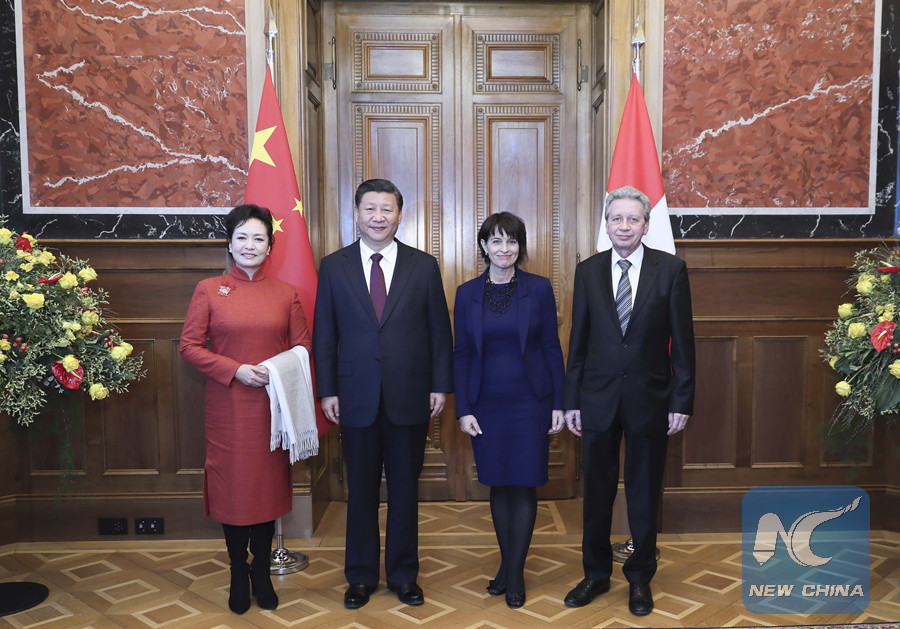
Chinese President Xi Jinping (2nd L) and his wife Peng Liyuan (1st L) are received by Swiss President Doris Leuthard (2nd R) and her husband Roland Hausin at the Swiss Federal Council in Bern, Switzerland, Jan. 15, 2017. (Xinhua/Lan Hongguang)
China and Switzerland have enjoyed long-term exchanges and cooperation. In 1950, Switzerland became one of the first Western countries to establish diplomatic relations with the newly-founded People's Republic of China. At the start of this century, Switzerland was among the first European countries to recognize China's full market economy status.
In recent years, Switzerland became the first continental European country to conclude and implement a free trade agreement with China.

